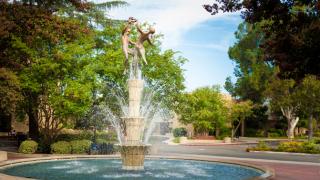For early-career researchers and physician-scientists just starting to build a laboratory, seed funding for their work can be tough to secure. But two beginning faculty at City of Hope are getting a boost for their innovative pilot studies thanks to the American Cancer Society (ACS).
Arya Amini, M.D., assistant clinical professor in the Department of Radiation Oncology, and Mustafa Raoof, M.D., assistant clinical professor in the Department of Surgery, both of whom joined the City of Hope faculty in 2017, have received awards for projects that aim to address critically important needs in the control of cancer. Amini will be looking into improving post-treatment imaging for lung cancer patients, while Raoof will explore new ways to approach chemotherapy-resistant pancreatic cancer.
Their funding is made possible through an ACS Institutional Research Grant (IRG), developed to support newly independent investigators as they initiate research projects.
“This early career funding is critical to establishing these outstanding young investigators in their research careers,” said Linda Malkas, Ph.D., the M.T. & B.A. Ahmadinia Professor in Molecular Oncology, associate chair of the Department of Molecular and Cellular Biology and dean of Translational Science. “These funds will help them obtain important initial data that will permit them to pursue larger external funding opportunities.”
Malkas is the overall principal investigator for City of Hope’s ACS-IRG. City of Hope was awarded the highly competitive IRG funding from the ACS earlier this year to fund pilot studies on novel types of cancer.
Improving Imaging With Machine Learning
Amini, a radiation oncologist, was awarded seed funding for his pilot study, “Image-based Biomarker to Differentiate Tumor Progression From Tumor Necrosis and Pseudoprogression After Radiation Therapy for Lung Cancer.”
The focus of Amini’s research is to use machine-learning — computer programming that analyzes thousands of data points to look for patterns — to help identify post-treatment outcomes in patients with lung cancer who have been treated with radiation.
Typically, after radiation is completed, physicians do follow-up imaging to see how well the treatment worked. But due to the limitations of current imaging techniques, a dead tumor looks very similar to a live tumor, so it is challenging for radiologists and radiation oncologist to figure out whether or not further interventions are needed.
To address this problem, Amini plans to take advantage of the fact that the imaging of tissue, such as a lung nodule, can reveal thousands of data points for a computer to assess. Each of these tiny data points is called a Hounsfield unit, and they can be measured one by one with sophisticated computer programs.
“Our goal is to be able to look at patterns of changes in the tiny pixels to see whether they correlate with tumor growth/real disease versus tumor death,” Amini said. “If we can come up with a better way to tell the difference between tumor death and live tumor, we can potentially minimize unnecessary anxiety, biopsies and additional therapies for patients.”
Amini and his team are using a novel computer program that can draw a tumor before and after treatment and analyze each individual pixel of the mass to see whether individual pixels over time correlate with tumor death as expected, or tumor recurrence. If successful, this program will help radiologists read computer tomography scans with increased accuracy and efficiency, leading to the improvement of patient care.
“Seed funding provides young investigators like me the opportunity to develop a research team and run innovating research projects that can lead to national funding,” Amini said. “In other words, it allows me to continue to pursue my passions in patient care and clinical research.”
Fighting Drug Resistance for Better Therapies
Raoof, a surgical oncologist, is working to develop better therapies for gastrointestinal cancers by exploiting vulnerabilities unique to these cancers. The project that he received seed funding for is called “Targeting DNA Repair in Chemotherapy-Resistant Pancreatic Cancer.”
Chemotherapy and radiation kill cancer by causing DNA damage. However, cancer cells can repair DNA damage and become resistant. Not only that, these repair pathways allow cancer cells to sustain and tolerate mutated DNA that forms the basis of an ongoing evolution of resistance to cancer therapies.
Raoof is currently focused on pancreatic cancer, which is one of the deadliest cancers. There are very few effective treatments, and available therapies have significant toxicities. Since DNA damage avoidance and repair pathways are important in the majority of pancreatic cancers, Raoof’s studies will aim to develop a small molecule inhibitor that targets those pathways without harmful side effects.
Raoof, in collaboration with Malkas, has already demonstrated exciting pre-clinical activity of a small molecule inhibitor (AOH1996) that targets DNA replication and repair in pancreatic cancer. The team has also identified gene targets that synergize with AOH1996. Building on these findings, they now hope to validate the gene targets using CRISPR gene-editing technology.
“This will not only allow us to determine resistance mechanisms to AOH1996, but also help us determine the best therapeutic combinations to overcome this resistance,” Raoof said.
He hopes that the data obtained through these experiments will be used to obtain future National Institutes of Health funding and that the findings will be relevant to other cancer types.
“Successful completion of these studies will inform optimal design of phase 1b/2 combination therapy clinical trials for pancreatic cancer, with the ultimate goal of improving survival rates for patients with the disease and possibly additional cancers,” Raoof said.
Amini and Raoof’s research projects are exciting in their scope and have clear potential to positively impact patient care, Malkas said.
“These young investigators represent the true strength of our science workforce pipeline, and City of Hope and the American Cancer Society are both dedicated to the continued development of young cancer researchers” she added.
